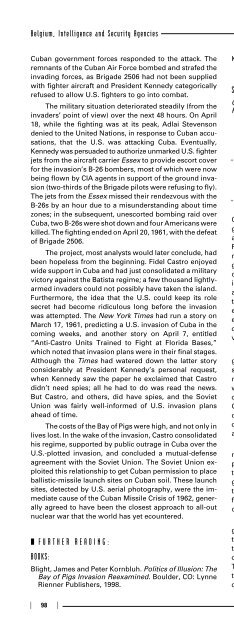ENCYCLOPEDIA OF Espionage, Intelligence, and Security Volume ...
ENCYCLOPEDIA OF Espionage, Intelligence, and Security Volume ...
ENCYCLOPEDIA OF Espionage, Intelligence, and Security Volume ...
Create successful ePaper yourself
Turn your PDF publications into a flip-book with our unique Google optimized e-Paper software.
Belgium, <strong>Intelligence</strong> <strong>and</strong> <strong>Security</strong> AgenciesCuban government forces responded to the attack. Theremnants of the Cuban Air Force bombed <strong>and</strong> strafed theinvading forces, as Brigade 2506 had not been suppliedwith fighter aircraft <strong>and</strong> President Kennedy categoricallyrefused to allow U.S. fighters to go into combat.The military situation deteriorated steadily (from theinvaders’ point of view) over the next 48 hours. On April18, while the fighting was at its peak, Adlai Stevensondenied to the United Nations, in response to Cuban accusations,that the U.S. was attacking Cuba. Eventually,Kennedy was persuaded to authorize unmarked U.S. fighterjets from the aircraft carrier Essex to provide escort coverfor the invasion’s B-26 bombers, most of which were nowbeing flown by CIA agents in support of the ground invasion(two-thirds of the Brigade pilots were refusing to fly).The jets from the Essex missed their rendezvous with theB-26s by an hour due to a misunderst<strong>and</strong>ing about timezones; in the subsequent, unescorted bombing raid overCuba, two B-26s were shot down <strong>and</strong> four Americans werekilled. The fighting ended on April 20, 1961, with the defeatof Brigade 2506.The project, most analysts would later conclude, hadbeen hopeless from the beginning. Fidel Castro enjoyedwide support in Cuba <strong>and</strong> had just consolidated a militaryvictory against the Batista regime; a few thous<strong>and</strong> lightlyarmedinvaders could not possibly have taken the isl<strong>and</strong>.Furthermore, the idea that the U.S. could keep its rolesecret had become ridiculous long before the invasionwas attempted. The New York Times had run a story onMarch 17, 1961, predicting a U.S. invasion of Cuba in thecoming weeks, <strong>and</strong> another story on April 7, entitled“Anti-Castro Units Trained to Fight at Florida Bases,”which noted that invasion plans were in their final stages.Although the Times had watered down the latter storyconsiderably at President Kennedy’s personal request,when Kennedy saw the paper he exclaimed that Castrodidn’t need spies; all he had to do was read the news.But Castro, <strong>and</strong> others, did have spies, <strong>and</strong> the SovietUnion was fairly well-informed of U.S. invasion plansahead of time.The costs of the Bay of Pigs were high, <strong>and</strong> not only inlives lost. In the wake of the invasion, Castro consolidatedhis regime, supported by public outrage in Cuba over theU.S.-plotted invasion, <strong>and</strong> concluded a mutual-defenseagreement with the Soviet Union. The Soviet Union exploitedthis relationship to get Cuban permission to placeballistic-missile launch sites on Cuban soil. These launchsites, detected by U.S. aerial photography, were the immediatecause of the Cuban Missile Crisis of 1962, generallyagreed to have been the closest approach to all-outnuclear war that the world has yet ecountered.❚ FURTHER READING:BOOKS:Blight, James <strong>and</strong> Peter Kornbluh. Politics of Illusion: TheBay of Pigs Invasion Reexamined. Boulder, CO: LynneRienner Publishers, 1998.Kornbluh, Peter. Bay of Pigs Declassified: The Secret CIAReport on the Invasion of Cuba. New York: The NewPress, 1998.SEE ALSOCuban Missile CrisisKennedy Administration (1961–1963), United StatesNational <strong>Security</strong> PolicyBelgium, <strong>Intelligence</strong> <strong>and</strong><strong>Security</strong> AgenciesOfficially upholding a declared policy of neutrality, Belgiummaintains a small number of defense, intelligence,<strong>and</strong> military forces. Belgium has three national languages,French, German, <strong>and</strong> Dutch, all of which are equally recognizedfor official government use. The nation’s centralgeographic location, varied linguistic structure, <strong>and</strong> policyof neutrality have aided the growth of Brussels as aninternational city <strong>and</strong> financial center. The Belgian capitalalso serves as the capital of the European Union (EU). Withthis added international responsibility, the Belgian governmentrestructured many of its intelligence <strong>and</strong> lawenforcement agencies in the early 1990s. National agencieswork closely with other EU member nations to providesecurity in the international capital.Belgium maintains both military <strong>and</strong> civilian intelligenceforces. The nation’s armed forces have varioussmall, strategic intelligence units, but the Permanent Committeefor the Control of <strong>Intelligence</strong> Services coordinateswide-scale military intelligence operations. The centralcommittee, a branch of the Ministry of Defense <strong>and</strong> theGeneral <strong>Intelligence</strong> Service, governs various operationaldivisions responsible for intelligence <strong>and</strong> security. Thecommittee also coordinates joint operations with military<strong>and</strong> civilian security services.The <strong>Intelligence</strong> Division of the Ministry of Defensemanages external intelligence operations. Charged withprotecting Belgian national interests at home <strong>and</strong> abroad,the <strong>Intelligence</strong> Division cooperates with military intelligenceto gather, process, analyze, <strong>and</strong> act upon information.Mainly focusing on information from <strong>and</strong> aboutforeign states, the <strong>Intelligence</strong> Division maintains a smalloperational division.A second operational division in the Belgian intelligencecommunity is the <strong>Security</strong> Division. Charged withthe protection of military security <strong>and</strong> classified informationregarding foreign agreements, the <strong>Security</strong> Divisionconducts surveillance of military property <strong>and</strong> operations.The <strong>Security</strong> Division also screens government <strong>and</strong> militaryofficials for various security clearances, granting accessto classified materials.98 Encyclopedia of <strong>Espionage</strong>, <strong>Intelligence</strong>, <strong>and</strong> <strong>Security</strong>







![The Big Lie 9-11 and Government Complicity in Mass Murder [PDF]](https://img.yumpu.com/50957077/1/190x245/the-big-lie-9-11-and-government-complicity-in-mass-murder-pdf.jpg?quality=85)








